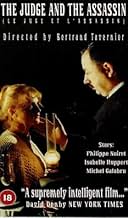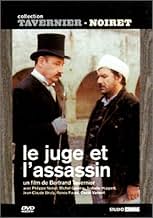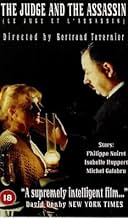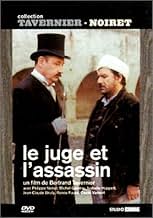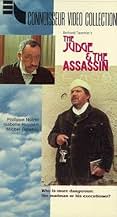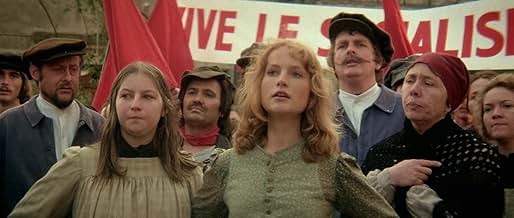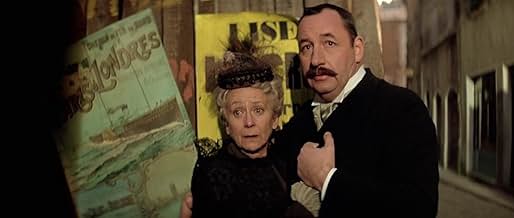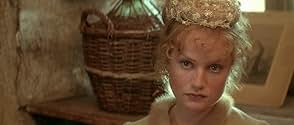Le juge et l'assassin
- 1976
- Tous publics
- 2h 8min
NOTE IMDb
7,3/10
2,5 k
MA NOTE
Un ancien sergent d'infanterie instable commet des crimes atroces. Un juge réfléchit à la manière dont cette affaire pourrait profiter ou nuire à sa carrière.Un ancien sergent d'infanterie instable commet des crimes atroces. Un juge réfléchit à la manière dont cette affaire pourrait profiter ou nuire à sa carrière.Un ancien sergent d'infanterie instable commet des crimes atroces. Un juge réfléchit à la manière dont cette affaire pourrait profiter ou nuire à sa carrière.
- Réalisation
- Scénario
- Casting principal
- Récompenses
- 3 victoires et 4 nominations au total
Jean-Claude de Goros
- Dr. Dutourd
- (as Jean-Claude de Gorros)
Avis à la une
Michel Galabru got the highest french award for his role in this movie, the "Cesar du meilleur acteur". Galabru became then one of the greatest actor in France.
Either in comedy or in tragedy (see "Le gendarme" and "L'été meurtrier".
Either in comedy or in tragedy (see "Le gendarme" and "L'été meurtrier".
This stupendous film by Bertrand Tavernier is set against the background of the Dreyfus Affair and the workers' struggles which led to the formation of the Confédération Générale du Travail. Under the spotlight here is the abuse of power by institutions and the inequalities of the justice system.
The two leading protagonists are serial rapist and murderer Joseph Bouvier, based upon real life Joseph Vacher and played to the hilt by Michel Calabru whilst judge Fourquet has here become the unscrupulous Rousseau and is personified by the immaculate Philippe Noiret. His character is not, as an earlier reviewer has suggested, based upon forensic doctor Etienne Lacassagne who is here named Degueldre and is played by Yves Robert.
Bouvier and Rousseau could be said to represent both sides of the same coin. Bouvier is undeniably a monster but is clearly insane(or is he?) whilst Rousseau is in full possession of his faculties and is determined to have Bouvier guillotined in order to further his own ambition, even to the point of cleverly gaining Bouvier's trust so as to extract a full confession.
Ambiguity reigns supreme here and who better to play Rousseau than Noiret whose working relationship with Tavernier, numbering nine films, is a marriage made in heaven. Tavernier not only gifted Noiret challenging roles but wisely gave him free rein in performance. It is understandably Michel Calabru's tour de force as Bouvier that earned him a well-deserved César. His is inspired casting for he was mainly known for his appearances in the popular 'Gendarme' series and there was nothing in his cinematic CV that would suggest he was capable of a performance of this magnitude. His tenure throughout the 1950's with the Comédie Francaise undoubtedly stood him in good stead for this demanding role.
Marvellous support from Jean-Claude Brialy, veteran Renée Faure and moving up the ranks, the twenty-one year old Isabelle Huppert who would again work with Tavernier and Noiret in 'Coup de Torchon' and is here just one year away from her iconic role as 'La Dentelliere'.
We owe Tavernier a debt of thanks for having brought legendary writing duo Jean Aurenche and Pierre Bost in from the cold and as one would expect from exponents of 'cinéma de qualité', their script is beautifully crafted, intelligent and trenchant. Tavernier's unerring sense of place and period and his eye for detail are in evidence here whilst his preferred cinematographer Pierre-William Glenn ensures gorgeous rural images. Inspired score by another of Tavernier's regulars Philippe Sarde with the final song based upon revolutionary tunes from the Commune.
The final caption which points out that although Bouvier's unfortunate young victims numbered twelve, no less than twenty thousand children perished in the mines, serves as a stark reminder of how elusive was the concept of 'Liberté, Egalité, Fraternité'.
The two leading protagonists are serial rapist and murderer Joseph Bouvier, based upon real life Joseph Vacher and played to the hilt by Michel Calabru whilst judge Fourquet has here become the unscrupulous Rousseau and is personified by the immaculate Philippe Noiret. His character is not, as an earlier reviewer has suggested, based upon forensic doctor Etienne Lacassagne who is here named Degueldre and is played by Yves Robert.
Bouvier and Rousseau could be said to represent both sides of the same coin. Bouvier is undeniably a monster but is clearly insane(or is he?) whilst Rousseau is in full possession of his faculties and is determined to have Bouvier guillotined in order to further his own ambition, even to the point of cleverly gaining Bouvier's trust so as to extract a full confession.
Ambiguity reigns supreme here and who better to play Rousseau than Noiret whose working relationship with Tavernier, numbering nine films, is a marriage made in heaven. Tavernier not only gifted Noiret challenging roles but wisely gave him free rein in performance. It is understandably Michel Calabru's tour de force as Bouvier that earned him a well-deserved César. His is inspired casting for he was mainly known for his appearances in the popular 'Gendarme' series and there was nothing in his cinematic CV that would suggest he was capable of a performance of this magnitude. His tenure throughout the 1950's with the Comédie Francaise undoubtedly stood him in good stead for this demanding role.
Marvellous support from Jean-Claude Brialy, veteran Renée Faure and moving up the ranks, the twenty-one year old Isabelle Huppert who would again work with Tavernier and Noiret in 'Coup de Torchon' and is here just one year away from her iconic role as 'La Dentelliere'.
We owe Tavernier a debt of thanks for having brought legendary writing duo Jean Aurenche and Pierre Bost in from the cold and as one would expect from exponents of 'cinéma de qualité', their script is beautifully crafted, intelligent and trenchant. Tavernier's unerring sense of place and period and his eye for detail are in evidence here whilst his preferred cinematographer Pierre-William Glenn ensures gorgeous rural images. Inspired score by another of Tavernier's regulars Philippe Sarde with the final song based upon revolutionary tunes from the Commune.
The final caption which points out that although Bouvier's unfortunate young victims numbered twelve, no less than twenty thousand children perished in the mines, serves as a stark reminder of how elusive was the concept of 'Liberté, Egalité, Fraternité'.
A French provincial town in the late 1890's where a Judge attempts to advance his political power by trying to prove that a soldier was not insane at the time of committing murder, which means soilder gets the guillotine and not the mad house. A movie that is more about the social turmoil in France.
I can't make a real judgment on this film, although the other reviews are rave ones. I just want to add that the story is based on an actual case of the 1890s in France. Joseph Vacher was the real life murderer who is the basis for Michel Galabrue's Joseph Bouvier. Like Vacher he was a former soldier, and he went about the countryside slaughtering young boy shepherds and young girl servants. His destruction of these victims (in terms of mutilations) rivaled his contemporary Jack the Ripper (Vacher was known as Vacher the Ripper). Although he was quite insane the public demanded a death penalty - he was guillotined in 1898. His crimes briefly took public attention off the matter of Captain Alfred Dreyfus.
The Philippe Noiret character is partly based on the noted criminologist Professor Alexander Lacassagne, who (despite considerable evidence of insanity) determined that Vacher was sane, and deserved the death penalty.
The Philippe Noiret character is partly based on the noted criminologist Professor Alexander Lacassagne, who (despite considerable evidence of insanity) determined that Vacher was sane, and deserved the death penalty.
The judge and the assassin is a strange and ironic title for this film. It does not represent what your mind immediately leads you to believe. It is about the arrest and trial of a psychopath, alas French auteur style. It bears in odd-about way a resemblance to Lacombe Lucien which was released two years earlier. Featuring a bravura performance by Michel Galabru ( he worn the Cesar, the French Oscar) as the serial killer, his trial becomes a study into the mind and evil of nation at the turn of the last century. Dealing with anti-semitism, civil unrest, disobedience and the tyranny of the France and the Church can make anyone crazy and an assassin. With strong performances by Tavernier favorite actor Philippe Noiret and a young Isabelle Huppert, it is a fine film in the tradition of French cinema prior to the advent of the New Wave.
Le saviez-vous
- AnecdotesThis is a fairly straight-forward account of the crimes of Joseph Vacher. "Vacher" and "Bouvier" both mean "cowherd" in French. The names of many of the characters - like Lacassagne - have not been changed.
- GaffesYou can see the shadow of the microphone and the boom moving across the wall of the chapel where the priest is giving his sermon about five minutes after the beginning.
- ConnexionsFeatured in Keskiyön auringon kuvat (1987)
- Bandes originalesLa Complainte de Bouvier l'Éventreur
Music by Philippe Sarde
Lyrics by Jean-Roger Caussimon
Performed by Jean-Roger Caussimon
Meilleurs choix
Connectez-vous pour évaluer et suivre la liste de favoris afin de recevoir des recommandations personnalisées
- How long is The Judge and the Assassin?Alimenté par Alexa
Détails
- Durée
- 2h 8min(128 min)
- Mixage
- Rapport de forme
- 2.35 : 1
Contribuer à cette page
Suggérer une modification ou ajouter du contenu manquant

![Regarder Bande-annonce [OV]](https://m.media-amazon.com/images/M/MV5BMGRkZTUzMWItY2NmZi00YWFhLTllZTMtZmQzNmFjNmFkY2M5XkEyXkFqcGdeQXRyYW5zY29kZS13b3JrZmxvdw@@._V1_QL75_UX500_CR0)
